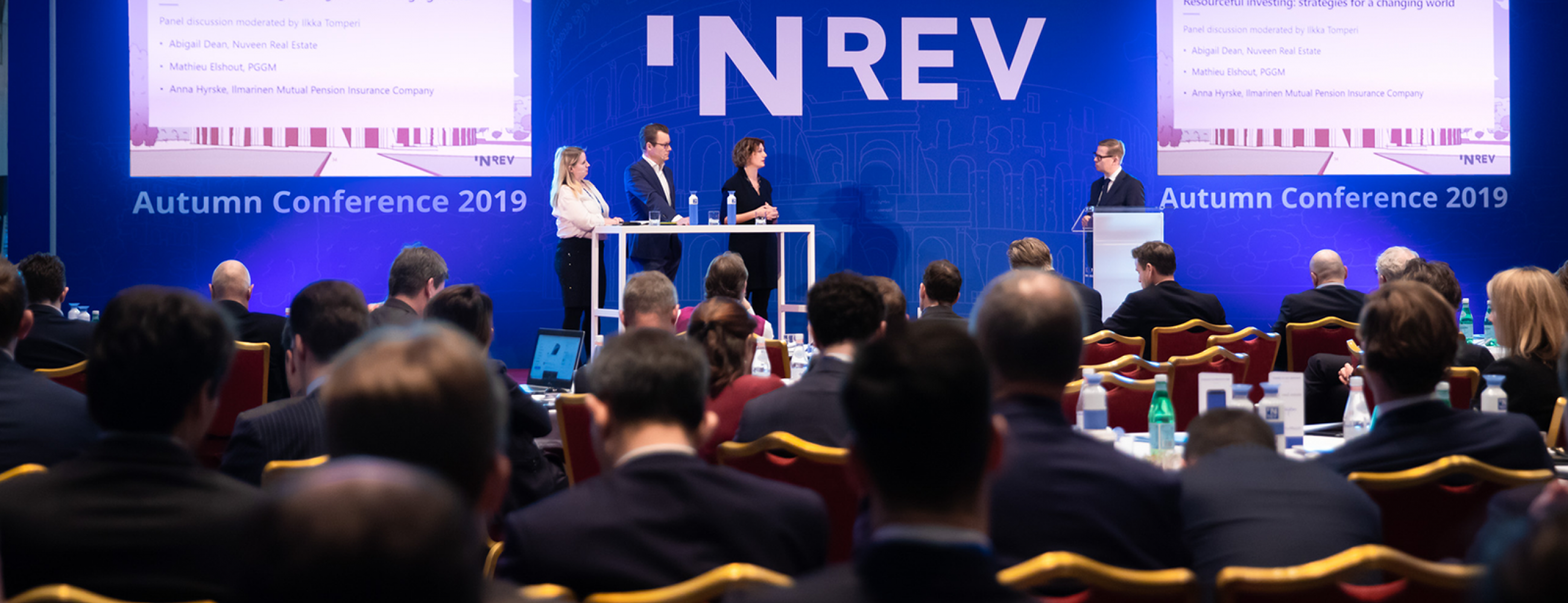Autumn Conference 2019 Rome: presentation summaries
In 2019, Rome played host to the fourth INREV Autumn Conference, one of its three flagship events attended by 190 of the industry’s mid to senior level INREV members to listen, discuss and network around a central theme of, ‘Building tomorrow’s industry today.’ Over 60% of the audience were first time attendees and collectively represented 16 different countries.
Climate change, digitalisation and the multi-generational workplace were three strong themes that came through the programme during the one-day conference. Joined by a carefully curated mix of industry experts and outside industry professional speakers, attendees left with a renewed knowledge of the latest trends and insights set to impact the non-listed industry.
A special thanks to our sponsors a.s.r. real estate, Jamestown and Property Match.
Save the date 2020 - the Autumn Conference 2020 will be held on 19 November 2020. Stay tuned to INREV News to find out the location of next year's conference.
Gillian Tett – Global slowdown: reading the warning signs

Beginning on an optimistic note, Gillian kicked off the conference declaring the outlook ahead is not actually as gloomy as we fear.
Taking the audience on a trip down memory lane, Gillian compared the times pre-GFC to the age old proverb that ‘Generals are taught to fight the last war’, meaning that in the world that we live in where there are economists churning out economic analysis every day, it is critical to use the correct data and metrics to analyse the financial landscape, and we must not always rely on past performance to predict the future. During the ‘Great Moderation’, when economists sat back believing everything was good and no one was predicting a recession, only the ‘financial weeds’ sitting in the belly of most financial and press institutions were looking at alternative data sets highlighting leverage loans and CLO’s – highlight irrational behavior which could have helped to foresee the catastrophe that lay ahead. Rather than obsessing over the inverted yield curve, Gillian suggested that the financial cycle is a more reliable indicator and that the cycle tends to boom ahead of a bust and in such, the current outlook is not that bad.
There has been remarkably little to see on the consumer price index (CPI) since 2005 and growth is at around 3% which is average. This said, Europe is probably heading for a slowdown and the same with the US but to a lesser extent. Of course, this was followed by a ‘but’. This prediction from Gillian was based on a business as usual scenario but this is not insulated from external shocks she cited as trade wars, environmental threat, and political instability with the rise of populism, which are all ever present issues that are not to be taken lightly. The Bank of England now champions green forecasting in its policy, the Financial Times itself looks more at macroeconomic threats and metrics once used by development economists are now considered as mainstream. We have come a long way but to be successful we have to think outside of the box as the events that will cause the most damage are the ones we expect the least.
Kenneth Cukier – Embracing change: how to create a culture of innovation in real estate

Following on from Gillian who urged the audience to think outside of the box in preparation for the new industry landscape, we were joined by Kenneth Cukier, Senior Editor at The Economist who in his keynote on how to cultivate a culture of innovation in the workplace, set out to describe innovation as three individual archetypes: Cassandra, The Jester and Joda, who all have very distinct traits that set them apart, and all personas enable an innovative workplace. The overarching message was that a diverse and varied team is paramount to encourage innovation, and Kenneth gave some tangible examples of organisations that have thrived when adopting this approach.
Fujifilm was the organisation cited as the Cassandra example; future-minded, a strong voice, open and empowering of their workforce – Fujifilm were able to embrace the evolution of photography and film. Where Kodak failed to innovate, Fujifilm were open to new sources of revenue and had empowered a workforce who were not afraid to voice these ideas at board meetings.
Taking Apple as an example, Steve Jobs – the mastermind behind Apple gave full design autonomy to his counterpart, Jony Ive who displayed traits of The Jester – curious, honest, playful and non-threatening. Kenneth explained to the audience that a playful character who is able to disarm tense situations is especially pertinent when looking to spark innovation.
Kenneth explained the Yoda archetype by alluding to IBM who were not afraid to think outside of the box when they used open innovation in sourcing components from other organisations in the quest to create the first home computer – they were not narrow in their thinking of only using their own resources but were open to embracing competition and change. Kenneth described the Yoda archetype as someone who sees potential, thinks long on ideas, has experience in the field and is a wise character.
Kenneth concluded with some tangible advice for the audience to take back to their organisations, suggesting that a shared vision is crucial – everyone has to be heading in the same direction, even if that is in their own way, that is ok. If we are to be successful in innovation, we should ‘red-team’ our ideas by testing out scenarios that might happen which opens the door for wider thinking and finding solutions and finally, that we should carry out a pre-mortem on projects – that we should already assess and analyse how things are going at an early stage, what can be done better. These tips in mind, we should also not be afraid to blend wisdom of the past with ideas of the future, and then we are heading for success.
Presentations and panel discussion on climate change and resourceful investing

After a morning looking at preparation for the next wave of industry evolution, the audience were then set for a new topic – climate change, with presentations delivered by Greenpeace, a reinsurer and a panel of investors who shared their thoughts on the ever-present topic.
Martin Norman, Sustainable Finance Campaign Director at Greenpeace declared that Climate Change must be in the forefront of all decisions we make, both in business and in life in general. Shocking to some, Martin reminded the audience that climate change is not a new topic, and that it has been a real threat since the late 70s and indeed in 1992 when the topic was declared as the biggest challenge of our time. He told the audience that while climate change is increasingly threatening our business’ and livelihoods, we do still have a chance at reversing the severity of impact and urged the audience to place climate change at the forefront of all decisions we make as individuals and organisations. We were next joined on stage by Jonathan Meagher from Munich RE, a reinsurer who gave us a very detailed analysis of the current climate situation and the various scenarios and possible outcomes for the insurance industry. Jonathan urged the audience to stay ahead of the game by knowing where assets are located and assessing risk in the portfolio from an asset level by using various tools and models to scope out future scenarios.
The climate segment was rounded off with a panel of investors sharing their thoughts on resourceful investing and strategies for a changing world. All three, Abigale Dean, Nuveen Real Estate, Mathieu Elshout, PGGM and Anna Hyrske, Ilmarinen Mutual Pension Company shared that they were engaging in ESG strategies in their organisations such as embedding expert teams across all asset class departments, using the GRESB tool for self-assessment and taking a wide view of the topic in the transition to net zero carbon. When asked if they’d be willing to accept lower yields for sustainable buildings, responses varied from not quite there yet, to taking a case by case approach with Abigail adding that in ten years, it is likely that buildings without sustainability improvements will hold much less value. On green finance, Anna shared that the fact that a building is green isn’t a reason for them to invest, it has to have an attractive return but green finance does form part of the overall risk management.
Discussing the technical approach to both physical and transitional climate risk, Mathieu shared that a long-term view is adopted to start with focusing on location risks to help assessing the gap that needs to be filled. Anna added that ‘Location, Location, Location’ is of paramount importance in assessing sustainability physical and transition risk, favoring TCFD reporting for this – something with INREV is launching in the near future as added by Abigail who is a member of the INREV ESG committee.
Paul Redmond - Minding the gaps: how to manage a multi-gen workplace

A very energetic, lively presentation packed with comedy value was delivered by Dr. Paul Redmond of Liverpool University, beginning by telling the audience that we are now in the age of the five-generation workplace: the silent generation of 70 year old’s are potentially in the same working environment as the millennials in their early 20s.
Of course, this poses some serious complications, Paul declared – tongue in cheek. For example, 78% of young people are willing to have an internet-connected device embedded in their arm if it means better connectivity (Source: AMDOCS/Redmond 2016). Of the current multi-generational workplace, Paul told how we need to think carefully about how we are communicating and interacting with the various segments (Silent generation, Baby boomers, Generation X, Generation Y and the Millennials).
Boomers value security and stability which underpins their decisions and are very loyal, attaching value to track record and reputation, while when communicating with Gen Y, conversations should begin with ‘Why?’ and aim for radical candour as they attach value to authenticity and expect hassle-free interaction. Currently, only 8% of organisations have a policy for building multi-generational teams (Chip Conley TED 2018) and Paul suggested that we should collaborate more and understand each segment’s culture for success.
Panel discussion – The new influencers: what young professionals really think about the industry

Following on from Paul, we welcomed our own industry cohort of millennials to the stage in a panel to discuss what they really think about the non-listed landscape. We were joined by Stoyan Zhelyazkov, Allianz Real Estate, Manuel Philippe Wormer, BVK and Olivia Muir, UBS. Discussing what they find most attractive about their career path, Olivia shared that the built environment and real estate’s ability to make an impact was a big plus point for her. All panelists agreed that the industry is a very social industry and very face to face which was also a positive factor.
When asked about what they value most in the workplace, Manuel told the audience how flexibility is a something which is highly sought after, with the other panelists agreeing with that and that their generation is expected to be reachable at all times but there is an extent to which this is possible, and that in turn, they should be able to have more flexibility in when they would like to work across the week. All panelists acknowledged that a good dialogue and meaningful channels of communication need to be established for this to work and is of course on a case by case basis.
Christian Gansch - From solo to symphony - what businesses can learn from orchestras

Sharing his symphony for success, the conference concluded with a vibrant and punchy keynote from Christian Gansch an International Conductor who delighted the audience with anecdotes of global success and how lessons from the orchestra can positively impact your business. Some key things to remember are, you are only as good as your team, emotions are not for the stage, be a role model and lead by example.
Christian also explained that similar to the composition of his orchestra, there are no ‘big roles’ or ‘small roles’, only ‘important roles’ – if struck at the wrong time, a tiny triangle percussion can destroy the symphony. Stressing the importance of culture, Christian told how in order to cultivate excellence, you need a positive atmosphere and to be able to disarm tension and heated moments – much like the Jester of Kenneth’s keynote. He wrapped up with a concluding food for thought: one powerful message is made by many voices.